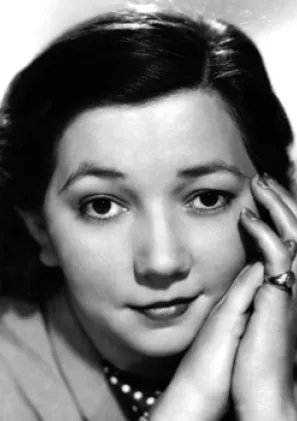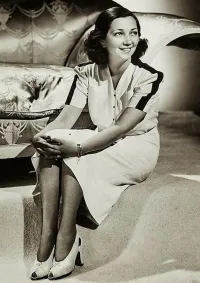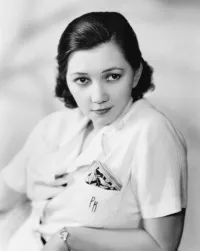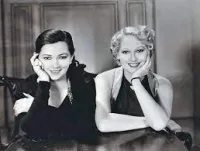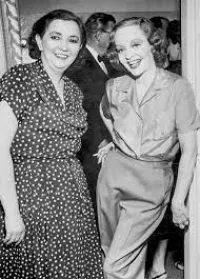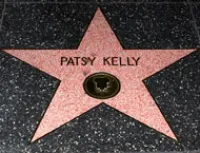Biography
1910 - 1981
“I'll be a flop in movies. Besides, I don't like 'em, and I never did believe there was a place called Hollywood. Somebody made it up!”
– Patsy Kelly
Patsy Kelly was born Bridget Rose Kelly on January 12, 1910, in Brooklyn, New York to Irish immigrants. She began performing in vaudeville at the age of 12, working with comedian Frank Fay. By the early 1930s, Kelly was starring in Broadway shows such as Wonder Bar and Earl Carroll’s Vanities. Soon the film world beckoned her. Kelly headed to Hollywood in 1933 where producer Hal Roach promptly paired her with Thelma Todd in a series of 21 comedy shorts which ended in 1935 with Todd’s death. Kelly soon began working in features, earning a name for herself as a wisecracking sidekick in numerous films throughout the decade such as Merrily We Live, Ever Since Eve, and Topper Returns. Kelly was a lesbian and despite the closeted nature of Hollywood in the 1930s, she was quite open about her sexuality and often referred to herself as ‘a dyke’ in public. In the 1930s, she disclosed to Motion Picture magazine that she had been living with actress Wilma Cox for several years and had no intention of ever marrying a man. By 1943, Kelly was working in low-budget productions and was nearly unemployable. This sad fact has been attributed both to her sexual openness as well as her out-of-control drinking. In the mid 1940s, Kelly opted to move back to New York. She worked as Tallulah Bankhead’s secretary and began a romantic relationship with the star. Kelly kept busy in radio and summer stock and eventually returned to acting in TV (The Man from U.N.C.L.E., Alfred Hitchcock Presents, The Dick Van Dyke Show, etc) and in films like Rosemary's Baby and Freaky Friday. She was bestowed with a Star on Hollywood Walk of Fame for Motion Pictures in 1960. In 1971, Kelly won Broadway’s Tony award in for Best Featured Actress in the musical No No Nanette and was nominated in the same category two years later for Irene. Her final film was Disney’s The North Avenue Irregulars. After suffering a stroke in January 1980 she moved into the Motion Picture and Television Country House and Hospital. The Queen of the Wisecracks died from cancer in Los Angeles on September 24, 1981.
1910 - 1981
“I'll be a flop in movies. Besides, I don't like 'em, and I never did believe there was a place called Hollywood. Somebody made it up!”
– Patsy Kelly
Patsy Kelly was born Bridget Rose Kelly on January 12, 1910, in Brooklyn, New York to Irish immigrants. She began performing in vaudeville at the age of 12, working with comedian Frank Fay. By the early 1930s, Kelly was starring in Broadway shows such as Wonder Bar and Earl Carroll’s Vanities. Soon the film world beckoned her. Kelly headed to Hollywood in 1933 where producer Hal Roach promptly paired her with Thelma Todd in a series of 21 comedy shorts which ended in 1935 with Todd’s death. Kelly soon began working in features, earning a name for herself as a wisecracking sidekick in numerous films throughout the decade such as Merrily We Live, Ever Since Eve, and Topper Returns. Kelly was a lesbian and despite the closeted nature of Hollywood in the 1930s, she was quite open about her sexuality and often referred to herself as ‘a dyke’ in public. In the 1930s, she disclosed to Motion Picture magazine that she had been living with actress Wilma Cox for several years and had no intention of ever marrying a man. By 1943, Kelly was working in low-budget productions and was nearly unemployable. This sad fact has been attributed both to her sexual openness as well as her out-of-control drinking. In the mid 1940s, Kelly opted to move back to New York. She worked as Tallulah Bankhead’s secretary and began a romantic relationship with the star. Kelly kept busy in radio and summer stock and eventually returned to acting in TV (The Man from U.N.C.L.E., Alfred Hitchcock Presents, The Dick Van Dyke Show, etc) and in films like Rosemary's Baby and Freaky Friday. She was bestowed with a Star on Hollywood Walk of Fame for Motion Pictures in 1960. In 1971, Kelly won Broadway’s Tony award in for Best Featured Actress in the musical No No Nanette and was nominated in the same category two years later for Irene. Her final film was Disney’s The North Avenue Irregulars. After suffering a stroke in January 1980 she moved into the Motion Picture and Television Country House and Hospital. The Queen of the Wisecracks died from cancer in Los Angeles on September 24, 1981.
Demography
Demography
Gender Female
Sexual Orientation Lesbian
Gender Identity Cisgender
Ethnicity Caucasian/White
Nations Affiliated United States
Era/Epoch Great Depression (1929-1939) Information Age (1970-present) Interwar Period (1918-1939) Roaring Twenties (1920-1929)
Field(s) of Contribution
Art, Music, Literature & Theater
Film
Television
Theater
US History
Commemorations & Honors
Hollywood Walk of Fame Star For Motion Pictures (1960)
Tony Award For Best Featured Actress in the Musical No No Nanette (1971)
Demography
Gender Female
Sexual Orientation Lesbian
Gender Identity Cisgender
Ethnicity Caucasian/White
Nations Affiliated United States
Era/Epoch Great Depression (1929-1939) Information Age (1970-present) Interwar Period (1918-1939) Roaring Twenties (1920-1929)
Field(s) of Contribution
Art, Music, Literature & Theater
Film
Television
Theater
US History
Commemorations & Honors
Hollywood Walk of Fame Star For Motion Pictures (1960)
Tony Award For Best Featured Actress in the Musical No No Nanette (1971)
Resources
Resources
Resources
